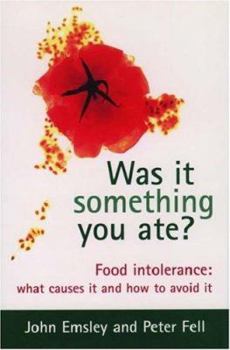Was It Something You Ate?: Food Intolerance: What Causes It and How to Avoid It
Select Format
Select Condition 
Book Overview
From reviews of the hardback edition: '...explains the difference between food intolerance (which we can all suffer from) and food allergy (which is very rare). Throughout, there are case studies of... This description may be from another edition of this product.
Format:Hardcover
Language:English
ISBN:0198504438
ISBN13:9780198504436
Release Date:January 2000
Publisher:Oxford University Press
Length:192 Pages
Weight:0.85 lbs.
Dimensions:9.8" x 0.8" x 6.5"
Customer Reviews
4 ratings
A clear and easy read
Published by Thriftbooks.com User , 18 years ago
This a a great book to read if you have an intolerance to certain things and don't know what to do.I have an intolerance to eggs and wheat, so this was a real eye opener. It is a nice and easy read.
To read
Published by Thriftbooks.com User , 21 years ago
a good book, very sintetic and clear. To me you have to read this absolutely.
Very informative
Published by Thriftbooks.com User , 21 years ago
This book presents a very informative introduction to foods that make people sick. The authors, a university chemistry professor and an allergist MD are quite knowledgeable. They present the mainstream scientific research on food intolerance in a way that is easy to comprehend for the general reader. Dr. Emsley's interest in chemistry is evident throughout the book as he explains the biochemistry of what happens to the food we put in our bodies as well as the chemistry behind food intolerance symptoms.Emsley and Fell are very clear on what is a food allergy and what is not. They explain that a person is properly said to have an allergy to food only if his or her immune system is involved in a negative response, and that true food allergies are not very common. On the other hand, many other people, perhaps as many as 20%, are intolerant of certain foods. According to the authors, this intolerance is because they lack the ability to break down the food into usable chemical substances. Food intolerance can cause many of the same symptoms as food allergies, but it is also implicated in such problems as headaches or mood disorders; in rare occasions, food intolerance attacks can even be fatal. With their definition of food intolerance as any situation where the body is overwhelmed by the chemicals in what has been consumed, the authors go beyond standard "problem foods" identified in other books on the topic (such as biogenic amines, salicylates, and sulfites). For example, they discuss how alcohol is broken down chemically in the body, and the chemistry behind drunkenness and hangovers. They also discuss the toxins involved in food poisoning, a very extreme type of intolerance reaction that everyone is susceptible to.Overall, I found this book highly informative, much more so than books that lump all food problems into the allergy category. The book includes a brief guide to nutrition and food for a healthy lifestyle, but these sections seem almost an afterthought. The book doesn't include a special diet or treatment plan. Instead, its main strength is the scientific explanations of what happens in a food intolerance attack. I think it will go a long way towards helping me understand why I can nibble some foods, but not indulge freely. In general, it's great for patient information, but MDs and naturopaths may also find much of interest.
Food intolerant? You need this book.
Published by Thriftbooks.com User , 23 years ago
At last - information on how, naturally occurring, food chemicals can make you ill. The food chemicals covered include amines, salicylates, caffeine, sulfur, MSG and lectins. If you are convinced that food is in some way making you ill but allergy tests and traditional elimination diets have shown up nothing then this is the book for you. You'll discover how even the 'healthiest' of foods such as fruit and vegetables can be toxic to some people. You'll also find out about natural toxins including, among many others, mad honey disease, mushroom and mold toxins. There are also sections on food additives and advice on vitamins. And chapters on alcohol and on the important role the gut has to play. I myself am salicylate sensitive and there is so little information generally available that I wholly applaud John Emsley and Peter Fell for making this information available. The only down side is that, although they present details of food chemicals and very useful case histories to illustrate the type of health problems that can be caused by these, they don't give much guidance on how to test for a sensitivity to these chemicals. But still, an excellent starting place.The book is clearly written and easy to read. An absolute must for anyone concerned about food chemicals.





